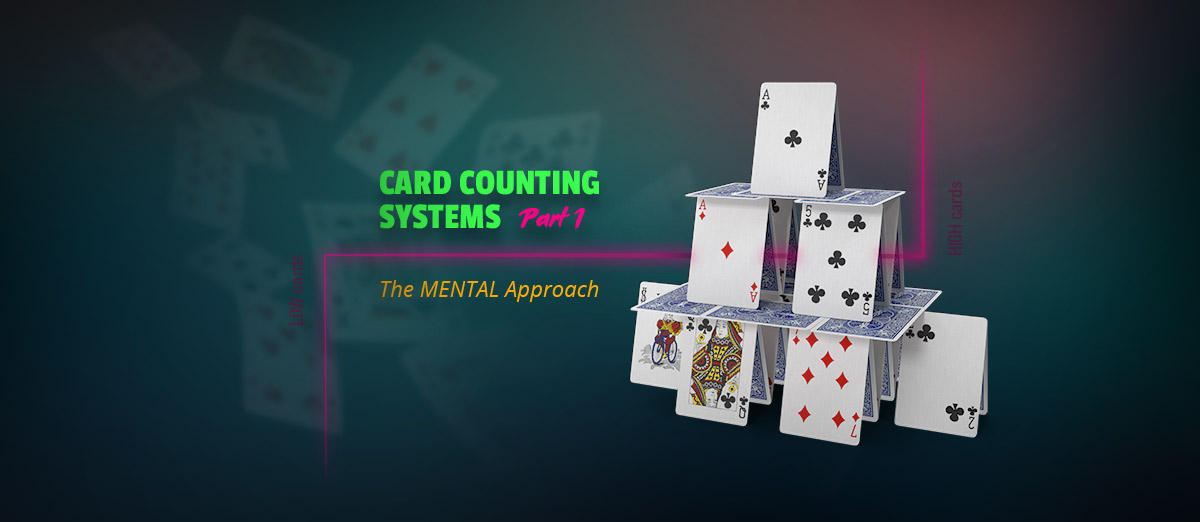Card Counting – The Traditional Tools of the Trade

There’s more to card counting than the basic principle of tracking high and low cards. As anyone who has tried any advantage strategy will attest, there are many problems to be solved and issues to be addressed by players hoping to secure an advantage without being asked to leave.
Basic Card Counting Principles and Factors
Using blackjack card counting as an example, let’s think about just a few of the factors that will eventually confront a rookie card counter. Firstly, there’s the counting system itself - the method that dictates what cards should be tracked and how the player needs to calculate the running count based on which values impact that particular system. I’m not going to get into the minor details of any system as we’d quickly fall into the weeds but let’s discuss our options in the broadest terms.
First, what game do we intend to play? Not all casino games are susceptible to card counting, but blackjack certainly offers more opportunity not only because of the number of strategic variations available to us but because many casinos offer a variety of game conditions, with some more vulnerable than others to a good counting system.
A hand-dealt single-deck game can offer good practice and good returns to players, but shuffle frequency, number of players, and available information - how many cards you get to see (and count) before gaining an advantage - are important factors when deciding what game to play and which of the card counting strategies to employ.
Multiple decks require the additional calculation of a true count from some systems while others do not but require players to track different values with varying adjustments to their running count. You count red sevens and not black, subtract one for nines but subtract two for tens or ignore some cards for some rounds but not for others based on how many players are in that round and how many hits they take, and what the dealer does, and—you get the idea.
Card Counting Systems and the Mental Gymnastics to Employ
There are some ingenious card counting systems for sure, but some require a lot more training than others to master the mental gymnastics needed at the table without looking like you’re having a stroke! Practicing any of these systems at home can build the mental muscles necessary to calculate information, but as soon as you sit down at a live table with all the sensory input and distractions of that location, those mental muscles quickly cease to work so well.
Until you have the facility to calculate on one level while dealing with the real world of dealers, cocktails, chips, and chatty players, your accuracy in terms of decision-making data is bound to suffer.
The solution is to start easy (by comparison) and build to your level of discomfort. An Ace/Five count is relatively simple to learn and apply while becoming accustomed to hiding in plain sight. As you become better at counting, playing, and dealing with the environment, you may quickly graduate to more complex systems that are better suited to your choice of game, and as you become better and the count becomes easier, you will become harder to spot by casino staff or security - at least until you start cranking those bets.
Cultivating the ability to count without any assistance from technology or other methods is by far the best approach, but many players quickly fall to gimmicks and devices that promise to make the counting part easy and the decision part automatic.
”Attacking” the Casino
Some years ago, I was making a TV show titled “The Takedown” where myself and a team of experts would target a particular game in a casino where we would hit that game as hard as we could and then see if we could make our getaway before security or management could identify what we were doing. Afterward, we would explain everything to casino staff and offer suggestions on how to better protect their games in the future.
Many of these attacks used computers to predict the outcome of games with varying results, and occasionally we used sleight of hand to cheat under the glare of suspicious pit bosses and cameras that were zoomed so close into our hands they could have captured our fingerprints. One of the simplest attacks we orchestrated used several methods of counting cards, including a special device that was designed to track high and low cards and then vibrate when the player should increase their bets.
How we purchased this “technological marvel” is interesting. We searched the internet for a “Blackjack Counting Device,” and from several options, we leaned towards one that was disguised as a key fob for a car, and there was a photograph with several car remotes on display, suggesting that our device would look like something every driver carries in their pocket. What arrived was quite the opposite. It was a small plastic box with three nodules as buttons that looked like it was cobbled together from spare electronic parts (it was) and in no way looked like a proper car remote.
We quickly returned to the photograph we had seen and immediately burst into laughter when we saw that this crappy little black device was placed amongst the more recognizable remotes in such a way that you would never notice it unless you really examined the photo. We’d been scammed, and we loved it! We loved it so much that we decided to take this piece of crap into Fitzgerald’s Casino in Downtown Las Vegas to see if it would work. It didn’t.
It could maintain a count, and it could send that count through a series of vibrations to the operator, but our colleague had to have it in her hand. When security took a close look at her, with one hand inside her purse and the other betting wildly based on her vibrating key fob, they quickly pulled her off the table and took her to the back room, where she found herself handcuffed and behind bars after they searched her bag!
In the meantime, I was already cashing out and heading for the door after using nothing but my brain and a simple card counting strategy. Naturally, I left Jennifer to face the music on her own!
A True Card Counter Needs No Device
The lesson here is that the method used to maintain and apply a running count dictates the outcome (and the risk) once the casino is on to you. If you resort to devices, then you might face serious charges, especially in places that have enacted specific laws regarding any kind of calculating device.
Truthfully, there is no substitute for a well-trained, experienced player who can successfully do card counting plus calculate and signal good information to a front-line player. Gaining competence and confidence takes time at home, performing countless drills with multiple decks until cards can be tracked at speed.
Next, the player needs to take those skills to the casino and practice for many hours while playing basic strategy for low stakes and secretly clocking each shoe, then assessing how accurate their information is under live conditions. Once ready, the player can begin to vary their bets, but many systems demand a twenty to one spread that’s sure to wake up even the sleepiest of pit bosses, so signaling other players to step up and bet big will quickly become necessary.
Strategies, Tips and Lessons Learned
One lesson I learned very early was to memorize tables of count scenarios based on running count, true count, and optimal bet sizes rather than make that calculation in real-time. The more I played, the quicker I could recall the table I had memorized for that scenario.
Whatever mental gymnastics or memory methods a player chooses to employ within a card counting blackjack strategy, for example, have little influence on the outcome unless they work to improve the accuracy and speed of the system being used. In my opinion, practice and experience are the only elements that matter - how you get to a true count is far less important than how fast and reliable that count is.
I’ve written many times about a casino corporation’s attempt to argue that the mind is a form of device in order to ban traditional card counting methods in the state of Nevada, but as many have pointed out, this is much the same as admitting they would prefer players not use their brains at the blackjack table!
Devices are dangerous for many reasons; in my next article, I’ll discuss the successful application of hidden electronics by professional teams and a few disasters that have happened along the way.
Read more:





Review this Blog
Leave a Comment
User Comments
comments for Card Counting – The Traditional Tools of the Trade